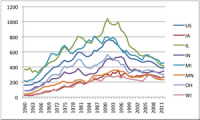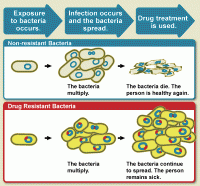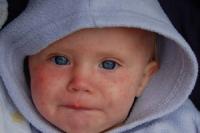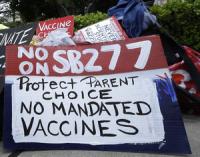-
Rise of European populism linked to vaccine hesitancy

There is a significant association between the rise of populism across Europe and the level of mistrust around vaccines, according to a new study. “It seems likely that scientific populism is driven by similar feelings to political populism, for example, a profound distrust of elites and experts by disenfranchised and marginalized parts of the population,” says the study’s lead author. “Even where programs objectively improve the health of targeted populations, they can be viewed with suspicion by communities that do not trust elites and experts.”
-
-
Biolabs accidents, and genetic modification research
Exposures to infectious diseases in Bioafety level-3 (BSL-3) and BSL-4 environments can be scary, but they do happen. Concern has always extended beyond the safety of the laboratory worker, but also that a pathogen of pandemic potential could be released. Other aspects of lab safety have raised concern as well, as more attention has been directed toward gain-of-function (GoF) research.
-
-
FDA unveils new food imports safety strategy
The U.S. Food and Drug Administration (FDA) on Monday unveiled a new strategy for ensuring the safety of imported foods, part of a comprehensive food safety overhaul in the wake of the FDA Food Safety Modernization Act of 2011. The FDA aid the United States imports about 15 percent of its food supply from more than 200 countries or territories, and that the quantity of imported foods is rising.
-
-
Experts question BioWatch’s replacement
BioWatch, the program launched more than fifteen years ago to detect bioterrorism attacks in major American cities, has been routinely criticized for not living up to its early promise. Many have suggested doing away with the system all together. Trouble is, experts say that BioDetection 21 – DHS’s proposed replacement for BioWatch – is even less effective.
-
-
Doctor-affiliated PACs fund candidates opposing gun safety policies
Researchers found that physician-affiliated political action committees provided more financial support to candidates who opposed increased background checks, contrary to many societies’ recommendations for evidence-based policies to reduce firearm injuries.
-
-
Reducing Illinois gun violence

Illinois could reduce the number of people killed each year by gun violence by implementing ten policies supported by available research, according to a new report. The Johns Hopkins report identifies weaknesses or gaps in current Illinois law and offers recommendations to reduce gun violence.
-
-
U.S. Coast Guard officer to be charged with mass terrorism plot
Christopher Paul Hasson, a U.S. Coast Guard officer will appear in court today (Thursday), charged with plotting a massive, 2-prong attack modeled after the 2011 Anders Behring Breivik’s terrorist attack in Norway. Breivik killed eight people in Oslo as a diversion, before killing 69 teenagers in a summer camp organized by the Norwegian Social Democratic Party. Hasson compiled a hit list of liberal politicians, Supreme Court judges, and journalists – but his violent plans extended to trying to “establish a white homeland,” and using biological weapons to “kill almost every last person on Earth.”
-
-
New layer of medical preparedness to combat emerging infectious disease
Researchers supporting the PREventing EMerging Pathogenic Threats PREEMPT program will model viral evolution in animal populations, quantify the probability of human pathogen emergence, and pursue proof-of-concept interventions to prevent viral spread to humans.
-
-
Are Russian trolls saving measles from extinction?
Scientific researchers say Russian social-media trolls who spread discord before the 2016 U.S. presidential election may also contributed to the 2018 outbreak of measles in Europe that killed 72 people and infected more than 82,000 — mostly in Eastern and Southeastern European countries known to have been targeted by Russia-based disinformation campaigns. Experts in the United States and Europe are now working on ways to gauge the impact that Russian troll and bot campaigns have had on the spread of the disease by distributing medical misinformation and raising public doubts about vaccinations.
-
-
Gain-of-function (GoF) research set to resume, and unease grows

Gain-of-function (GoF) research involving H5N1 is set to resume – but without review comments, as the review panel has kept mum. Many scientists are worried, arguing that certain studies that aim to make pathogens more potent or more likely to spread in mammals are so risky they should be limited or even banned.
-
-
New estimates aim to define the true burden of superbug infections
Millions of Americans who experience complications from an antibiotic-resistant infection each year. These infections place a substantial clinical, emotional, and financial burden on patients, their families, and the US healthcare system. But just how many people in the United States are dying from antibiotic resistance? Many researchers and epidemiologists wrestle with that question.
-
-
Antimicrobial resistance: A neglected biodefense vulnerability

We typically think that biodefense is about defending against bioterrorism or the next pandemic – or, in extreme cases, about some laboratory accident. Biodefense is mostly about all these things, but also about much more. Antimicrobial resistance is not a headline-grabbing topic and it certainly is not getting its own apocalyptic outbreak movie anytime soon, but the microbial threat has been growing since antibiotics were first discovered.
-
-
How to talk to anti-vaxxers
Despite an abundance of evidence showing that vaccines are perfectly safe and save lives, many people reject them, stoked by the frightening misinformation that spreads over social networks. Vaccine refusal is having a real-world impact. Two decades ago, measles was all but eradicated from the U.S. Now, cases are skyrocketing, with more than 1,700 infections since 2010. in the first six months of 2018, more than 41,000 Europeans contracted measles and 37 died.
-
-
Measles spreading in U.S., mostly among unvaccinated children

Measles is spreading in the U.S. As of 5 February, there were 50 cases in Washington state and five in Houston. New cases are being added daily. Health officials, including the U.S. surgeon general, are urging parents to get their children vaccinated.
-
-
A global wave of measles cases fed by conspiracies and misinformation has health officials worried

The number of people infected with measles keeps rising in the Washington State and neighboring Oregon. Rick Noack writes that “complacency over vaccinations has been accompanied by outright rejection of the scientific evidence on measles vaccines that has saved over 21 million lives since 2000, according to the WHO. Unsubstantiated conspiracy theories on supposedly negative side effects of vaccinations, either against measles or in a broader context, have gained momentum in some communities, in the United States and other countries.” He notes that deliberately spreading misinformation on vaccines to suggest that citizens are being lied to by their leaders has become a go-to recipe of some populist politicians. Thus, after years of railing against vaccines and even proposing a law against them in 2015, Italy’s Kremlin-supported Five Star Movement is now part of the country’s government.
-
More headlines
The long view
Global Anxiety and the Security Dimension: From Personal Despair to Political Violence
Uncertainty and despair—born of economic insecurity, social isolation, and widening inequality—have fueled a striking surge in anxiety across the United States. But this mental-health crisis is not confined by borders.
The Silent Epidemic: America’s Growing Anxiety Crisis
Anxiety—once dismissed as mere nerves or a passing phase—has become one of the most prevalent and debilitating public health issues facing Americans today. how did we get here—and what do we do now?
